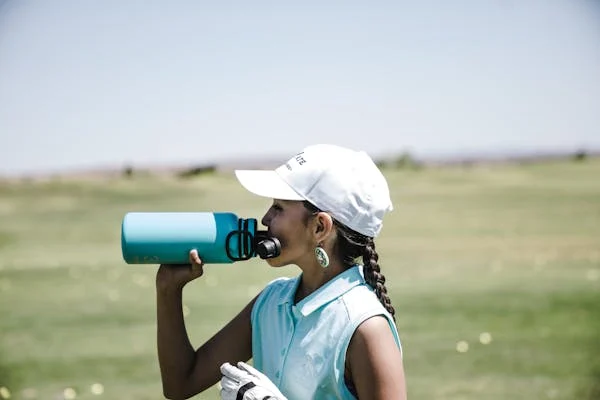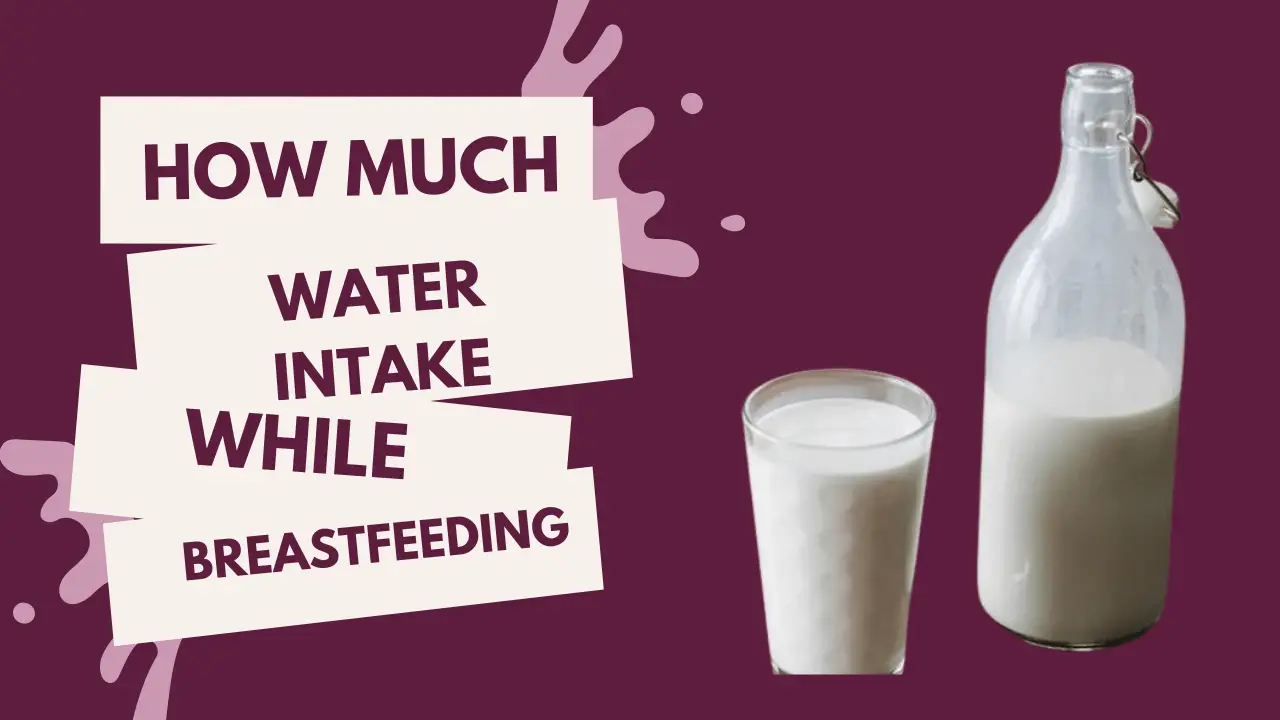Staying properly hydrated throughout the breastfeeding process is essential for the mother’s health as well as the caliber of the milk produced. How much water should I drink a day while breastfeeding? is a question that many nursing women have.
This is a crucial question because lactation increases the body’s water requirements, which impacts the amount of milk produced by the mother as well as her level of hydration.
This thorough article will go over the significance of staying hydrated when nursing, go over the recommended daily intake of water, and offer helpful advice on how to efficiently fulfill your daily hydration needs.
You may maximize your baby’s nutrition through breastfeeding and promote your own health by comprehending and following these recommendations.
Why Hydration is Crucial During Breastfeeding:
Staying hydrated is essential for breastfeeding moms because breastmilk is about 90% water! Think of your body as a milk factory, and water is the key ingredient. Here’s how good hydration keeps things running smoothly:

- Milk Supply: When you’re dehydrated, your body may prioritize its own needs over milk production, leading to a dip in supply.
- Milk Quality: Adequate fluids help ensure your milk is nutrient-rich and delivers everything your baby needs to thrive.
- Your Health: Dehydration can zap your energy, cause headaches, and even impact your mood. Staying hydrated keeps you feeling your best while caring for your little one.
How Much Water Should I Drink a Day While Breastfeeding?
While individual needs can vary, breastfeeding moms generally require more fluids than usual. A good rule of thumb is to drink to thirst and aim for around 16 cups (3.8 liters) of water daily. Here are some tips:
- Carry a reusable water bottle with you and take sips regularly throughout the day.
- Drink a glass of water before each feeding session.
- Choose water over sugary drinks.
- Monitor your urine color. Pale yellow means you’re well-hydrated, while darker urine indicates a need for more fluids.
Factors Affecting Water Intake:
The quantity of water that a nursing mother needs to drink each day depends on several factors. Determining the ideal levels of water during lactation requires an understanding of these variables. How much water should I drink a day while breastfeeding? is a common query.
This is a crucial question because personal demands differ according to body weight, environment, degree of physical activity, and general health.

- Body Weight: Generally, heavier individuals require more water to support bodily functions, including milk production.
- Climate: Hot and humid climates increase sweat and fluid loss, necessitating higher water intake.
- Physical Activity: Active lifestyles require more fluids to compensate for increased sweating and energy expenditure.
- Breastfeeding Frequency: The more frequently a mother breastfeeds, the higher her fluid requirements are due to increased milk production.
- Health Conditions: Certain health conditions, like fever or illness, can increase water needs.
It’s essential to monitor these factors and adjust your water intake accordingly. Breastfeeding mothers are encouraged to listen to their bodies and drink when thirsty, as thirst is a reliable indicator of hydration needs.
By considering these factors, you can ensure adequate hydration, supporting both your own health and optimal milk production for your baby.
Guidelines for Hydration:
To make sure nursing moms get the extra water they need, it’s critical to set clear criteria for hydration. How much water should I drink a day while breastfeeding? is a frequently requested question. The answer to this crucial question establishes the baseline daily fluid intake required for the health of the mother and sufficient milk production.

- Daily Water Intake Recommendations: The general recommendation for breastfeeding mothers is to consume at least 8-10 cups (approximately 64-80 ounces) of water per day. This amount can vary based on individual factors such as body weight, activity level, and climate.
- Monitoring Thirst Cues: Thirst is a natural indicator of hydration needs. Breastfeeding mothers should pay attention to their thirst levels and drink water whenever they feel thirsty, as it’s a reliable signal that the body needs more fluids.
- Urine Color: Monitoring urine color can also provide insights into hydration status. Clear or light-colored urine usually indicates adequate hydration, while dark urine may suggest dehydration.
- Environmental Factors: Hot and humid weather conditions or engaging in strenuous physical activity may increase water requirements. In such cases, it’s essential to increase fluid intake accordingly.
- Hydrating Foods and Beverages: Consuming fruits, vegetables, and beverages like herbal teas can contribute to overall hydration levels, complementing water intake.
By following these guidelines, breastfeeding mothers can maintain optimal hydration levels, supporting their own health and ensuring sufficient milk production for their babies.
Specific Water Needs:
Understanding the specific water needs during breastfeeding is crucial for ensuring adequate hydration and supporting optimal milk production.

The question often asked is, how much water should I drink a day while breastfeeding? This question is pivotal because it addresses the personalized requirements based on individual factors such as body weight, climate, and physical activity levels.
- Body Weight Considerations: As a general guideline, breastfeeding mothers are recommended to consume additional fluids beyond the average daily intake. Typically, this translates to about 8-10 cups (64-80 ounces) of water per day. However, heavier individuals may need more water to support metabolic processes and milk production.
- Climate and Environment: Hot and humid climates increase sweat and fluid loss, requiring higher water intake to maintain hydration levels. Similarly, living in high-altitude areas or engaging in strenuous physical activities can also elevate water requirements.
- Breastfeeding Frequency: The frequency of breastfeeding sessions directly impacts water needs. Mothers who breastfeed more frequently may need to drink more water to replenish fluids lost through milk production.
- Monitoring Hydration: It’s essential for breastfeeding mothers to listen to their bodies and drink water whenever they feel thirsty. Thirst is a reliable indicator that the body needs more fluids to support lactation and maintain overall health.
By understanding these specific water needs and factors influencing hydration, breastfeeding mothers can tailor their fluid intake to support both their own well-being and optimal milk supply for their babies.
Practical Tips for Staying Hydrated:
Maintaining adequate hydration is essential for breastfeeding mothers to support their own health and milk production. A common question is, “How much water should I drink daily while breastfeeding?” This is crucial as it highlights the importance of consistent hydration tailored to the needs of lactating mothers.
- Carry a Water Bottle: Keep a reusable water bottle with you at all times, making it convenient to sip water throughout the day, especially during breastfeeding sessions.
- Set Reminders: Use alarms or smartphone apps to remind yourself to drink water regularly, aiming to consume fluids at regular intervals.
- Hydrating Foods: Incorporate hydrating foods such as fruits (e.g., watermelon, oranges), vegetables (e.g., cucumber, celery), and soups into your diet. These foods contribute to overall fluid intake.
- Herbal Teas and Fluid Alternatives: Explore options like herbal teas, coconut water, or diluted fruit juices as alternatives to plain water, providing variety while maintaining hydration.
- Monitor Urine Color: Check urine color regularly; light-colored urine indicates adequate hydration, while dark urine may signal dehydration.
- Prevent Overhydration: Avoid excessive intake of caffeinated beverages or sugary drinks, as they can have diuretic effects and interfere with hydration.
By implementing these practical tips, breastfeeding mothers can effectively manage their fluid intake, ensuring optimal hydration levels to support their health and lactation needs.
Hydration Myths and Facts:
Proper hydration is crucial for breastfeeding mothers, but there are many myths and misconceptions about how much water is necessary. The question how much water should I drink a day while breastfeeding often brings to light various myths that need to be debunked to ensure accurate information is available.
- Myth: You Need to Drink a Gallon of Water a Day
- Fact: While it’s important to stay hydrated, a gallon of water a day is not necessary for everyone. The general recommendation is about 8-10 cups (64-80 ounces) of water daily, with adjustments based on individual needs and factors like body weight, climate, and activity level.
- Myth: Thirst is Not a Reliable Indicator
- Fact: Thirst is a natural and reliable indicator of your body’s need for water. Breastfeeding mothers should listen to their thirst cues and drink accordingly, ensuring they meet their hydration needs.
- Myth: More Water Equals More Milk
- Fact: While staying hydrated is essential for milk production, excessively drinking water will not significantly increase milk supply. Balanced hydration supports optimal lactation without the need for excessive fluid intake.
- Myth: Only Plain Water Counts
- Fact: Hydration can come from various sources, not just plain water. Herbal teas, milk, and hydrating foods like fruits and vegetables all contribute to your overall fluid intake.
- Myth: Coffee and Tea Dehydrate You
- Fact: Moderate consumption of caffeinated beverages like coffee and tea does not cause significant dehydration. They can still contribute to your daily fluid intake, but it’s best to balance them with other hydrating options.
By understanding and debunking these myths, breastfeeding mothers can focus on accurate guidelines and ensure they stay properly hydrated.
Conclusion:
It’s critical to know how much water should I drink a day while breastfeeding in order to encourage optimal milk production and maintain your health. You may guarantee proper hydration by adhering to the advised guidelines, being aware of the elements that impact hydration, and putting the helpful advice into practice.
Recall that staying hydrated and giving your baby the best nutrition possible may be achieved by paying attention to your body’s thirst signals and including hydrating meals and beverages in your diet. Click to learn more.
FAQs:
1: How much water should I drink a day while breastfeeding?
Answer: Breastfeeding mothers should aim to drink about 8-10 cups (64-80 ounces) of water per day, adjusting based on individual needs and factors like climate and activity level.
2: Can I drink other beverages besides water to stay hydrated while breastfeeding?
Answer: Yes, you can drink herbal teas, and milk, and consume hydrating foods like fruits and vegetables to help meet your hydration needs.
3: Does drinking more water increase milk supply?
Answer: Staying hydrated supports optimal milk production, but excessively drinking water won’t significantly increase your milk supply.
4: How can I tell if I’m adequately hydrated while breastfeeding?
Answer: Monitor your thirst cues and urine color; light-colored urine usually indicates adequate hydration, while dark urine may suggest dehydration.
5: Is it safe to drink caffeinated beverages like coffee and tea while breastfeeding?
Answer: Moderate consumption of caffeinated beverages is generally safe and can contribute to your daily fluid intake, but it’s best to balance them with other hydrating options.
